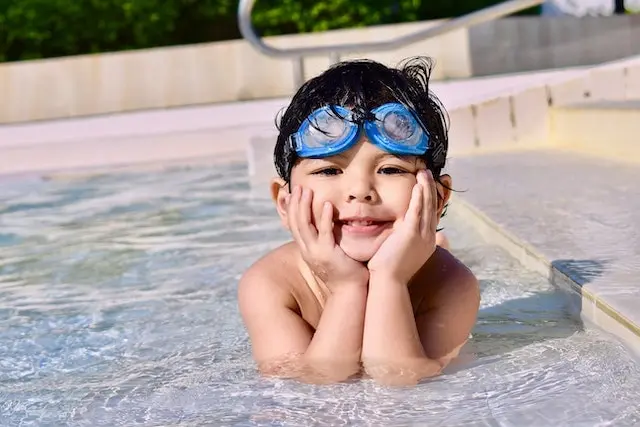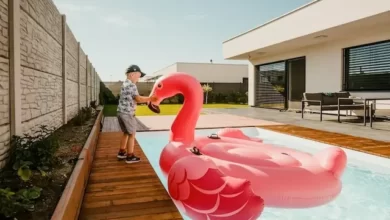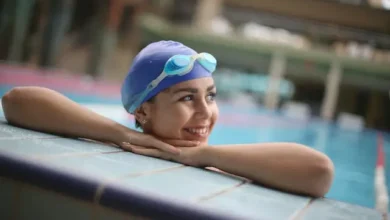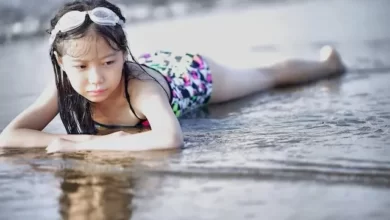Baby Swimming Class and Safety Related 7 Essential Questions: Start your little one’s aquatic journey today!
In this article
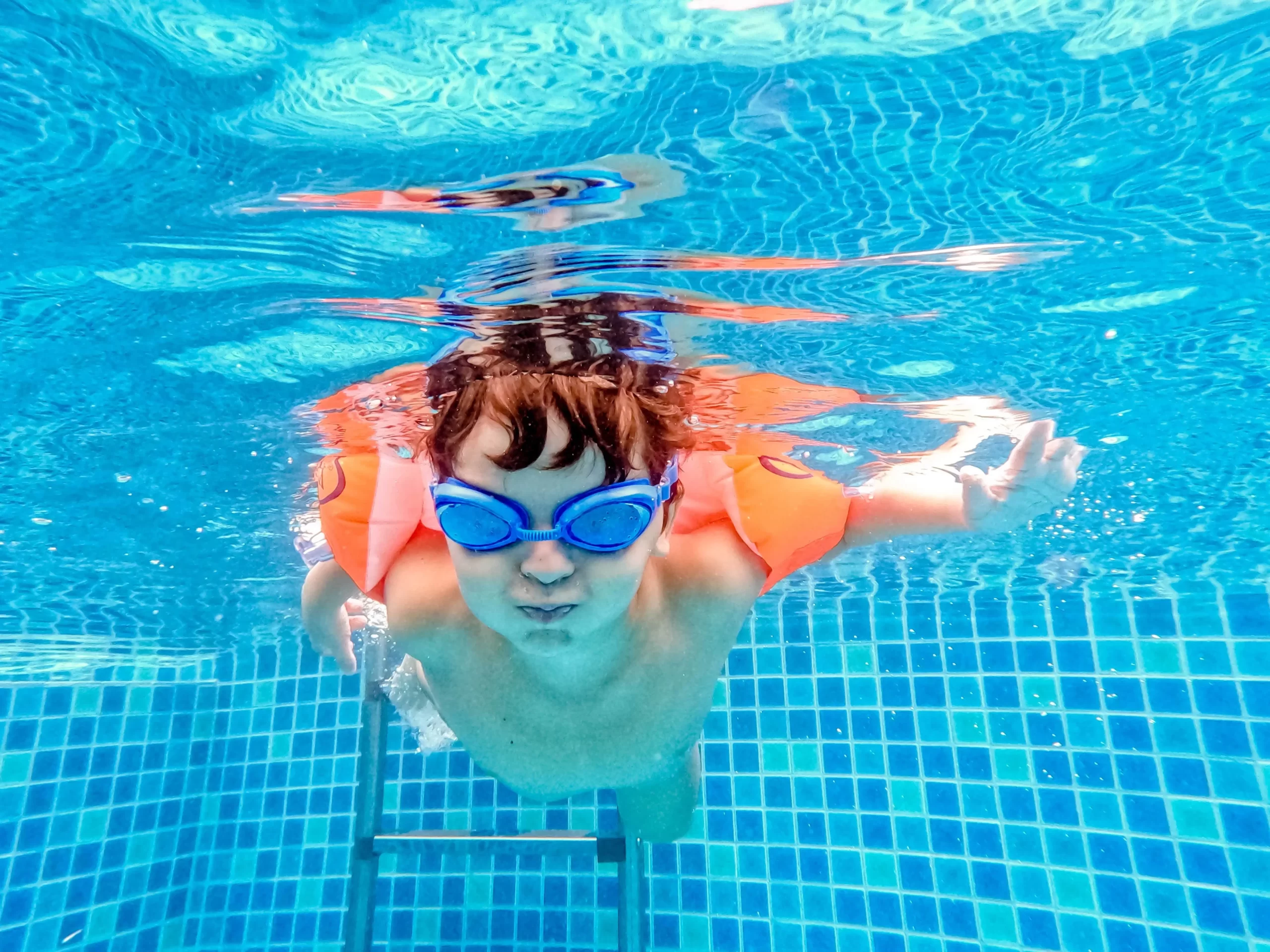
Want more? Upgrade today to the PRO version. Contemplating whether or not to enrol your newborn in a swimming class? Weighing the benefits alongside potential drawbacks is highly recommended.
Safety measures must never be compromised while making this decision. The idea of introducing your little bundle of joy to the water can be both exciting and nerve-wracking at the same time.
However, with the appropriate swimming class, you can create a safe and enjoyable environment for your shining star to explore the aquatic world. This blog post will guide you through choosing the perfect swimming class for your baby. From assessing safety measures to evaluating instructors, we will cover all the crucial factors to ensure a positive and enriching swimming experience for your little swimmer.
When is the right time to start swim class for babies?
The perfect age to start a baby swimming class can vary. But most programs accept infants as young as three months old. Here are a few considerations regarding the ideal age:
- Have a consultation with your paediatrician: Before enrolling your baby in a swimming class, consult with your paediatrician to ensure that your little one is physically prepared for the experience.
- Early infancy: Some parents choose to start swimming classes when their babies are around three to six months old. At this age, babies have developed neck control and are more comfortable in the water.
- Older infants: If you haven’t introduced your baby to swimming in their early infancy, don’t worry. Many swimming classes cater to older infants as well, allowing them to join at any age between six months and beyond.
What qualifications should you look for in a baby swim instructor?
The choice of a baby swim instructor should be taken seriously as the right choice not only ensures safer exercise sessions but also guarantees expertise that benefits the babies’ confidence in the water. The following are several qualifications to consider when searching for an appropriate baby swim instructor:
Certification: Certified instructors guarantee certification from well-recognized organizations specialized in educating aquatic exercise instructors, particularly for toddlers aged under three years. For instance, Infant Aquatics℠ Certification or Swim Australia™ Teacher of Babies and Toddlers provides certified programs suitable for infant aquatic education programs candidates
Experience and Training: Look for instructors experienced working specifically with infants and toddlers in pool facilities and completed additional courses or workshops geared towards child development addressing water safety parameters regarding young kids’ fickle disposition.
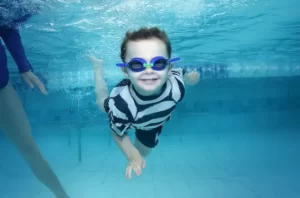
Knowledge of Child Development: An exceptional infant swim coach must have complete insight into how children’s development affects motor skills like cognitive abilities per age group; hence proper planning geared towards addressing such differences rather than generalization into all students. It is therefore paramount that your potential instructor knows the physical and psychological differences between infants and older children.
CPR and First Aid Certification: Certification in both infant and child CPR (Cardiopulmonary Resuscitation) along with first aid skills are not only vital in emergencies but also form part of safety protocols instituted for babies under their care.
Safety Measures: Safety protocols ensure secure exercise lessons, essential aspects considered when conducting aquatic exercises in any swimming milieu.
Ensure that the prospective instructor upholds necessary safety precautions such as hygienic protocols and safety instructions for the child’s comfort. An ideal candidate should prioritize great communication skills while addressing preemptive measures (e.g., flotation devices to prevent drowning,) to ensure injuries are avoided.
What safety measures should be in place at the swimming facility?
Discuss the critical safety aspects, such as pool cleanliness, water sanitation, lifeguard presence, emergency protocols, and proper pool maintenance.
What are the best swimming class near you?
- Water Babies is a well-known baby swimming program with locations throughout the USA. Their classes focus on introducing babies and toddlers to water through gentle and progressive techniques. You may visit their website at https://www.waterbabiesusa.com/
- Aqua-Tots Swim Schools offer swimming lessons for babies, toddlers, and children. Their program emphasizes water safety, skill development, and building confidence in the water. You can explore their website at https://www.aqua-tots.com/
- Little Fishes Swim School specializes in teaching swimming to infants, toddlers, and young children. They offer classes that focus on water acclimation, safety skills, and stroke development. Visit their website at https://www.littlefishesswimschool.com/
What should you consider when assessing the pool environment?
Consider the following factors when assessing the pool environment:
- Water temperature: Make sure that the water temperature is appropriate for your baby’s body and it should be (90-93 degrees) F, to keep them calm and comfortable while they are in the water.
- Pool size and depth: A small pool or a shallow pool area is always beneficial for your baby. it makes them feel secure and enables easy interaction with the instructor and parents sometimes.
- Cleanliness and hygiene: Keep your eye on the cleanliness and hygiene of the pool. Look for water filtration and disinfectant method to ensure a safe and sanitary environment for your baby.
Are parent-child swimming classes beneficial?
A parent-child swimming class is beneficial. It gives the child a sense of security and allows parents to actively participate in their baby’s swimming journey. Discuss the advantages of parental involvement.
How do I evaluate the teaching methods used in a swimming class?
The teaching methods in the swimming class can significantly affect your baby’s learning process. Consider the following factors when evaluating the teaching methods:
- progressive approach: A good swimming class always should follow a progressive curriculum that introduces skills gradually to ensure your baby’s comfort and confidence in the water.
- Gentle and positive reinforcement: Look for an instructor who uses positive reinforcement to encourage and motivate your baby in the water. This teaching technique makes a difference in your little one’s swimming journey.
- Age-appropriate water activities: The swimming instructor should introduce age-appropriate enjoyable and engaging water activities and games for your baby. This encourages them and helps to make the learning process more joyful.
Conclusion:
Enrolling your baby in a swimming class can be a great opportunity for them to develop water adaptation, safety skills, and physical abilities while bonding with you and another infant. By considering factors such as safety measures, hygiene, the instructor’s qualifications, and the reputation of the pool, you can choose the perfect swimming class for your little star. Always choose a swimming class that is age-appropriate and prioritize the baby’s safety and enjoyment together.
So, why wait? Dive into the world of baby swimming and let your baby be a healthier version of themselves. Have fun with them.
